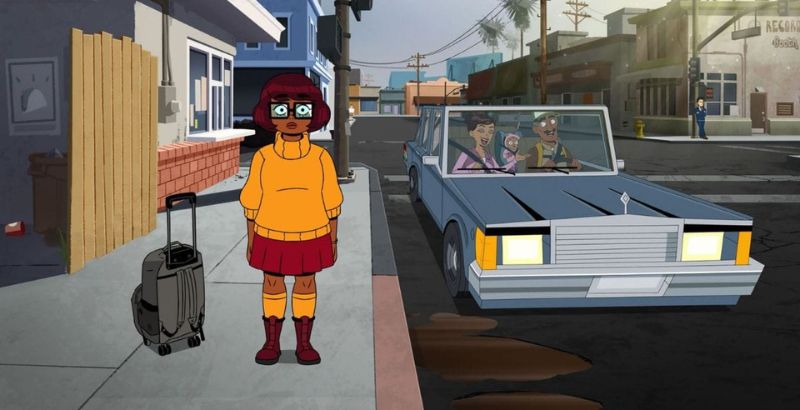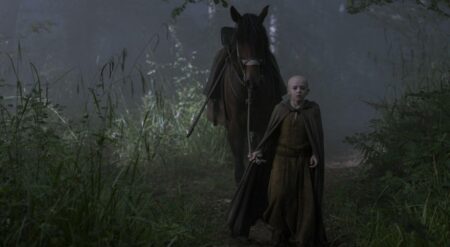Velma episode 5 and 6 pick up on the season-long mystery of finding Velma’s mother and Daphne struggling to understand her identity. The two episodes feel like a call and response to the meta-narrative of Velma and its desperate attempt to subvert the ideals of Scooby-Doo. Each week, the show attempts to place itself in the legacy of the Mystery Gang but Velma Episodes 5-6 fumbles for any real chance of redemption.
There is a two-fold problem with Velma. For one, Velma continues to be pitted as the main antagonist of the show accidentally; while doing so, the ethos of Velma is antithetical to Scooby-Doo. Viewers are trusted in Velma’s investigation through her relationship with Norville. As previously explored, Velma hallucinates when dealing with her guilt for her missing mother. The only person able to get her to stop is Norville and his humor. While nothing about this is inherently an issue, the power dynamic between Norville and Velma is in-universe described as him “simping” for her.
Velma cracks jokes about her obvious manipulation of Norville, and this comes to a halt when Norville begins dating a girl named Gigi. With black and blue lipstick, gothic clothes, and a stylistic edge, I’m fascinated that sometimes Velma’s animation and character designs trick me into continuing to watch. Velma looks and feels so fun and fresh in the landscape of very similar-looking shows (think Rick and Morty, Big Mouth, and Hoops). However, Velma opens her mouth to mock Norville’s new girlfriend for telling Norville to establish boundaries with Velma. Where the punchline is, fails to be found when it just showcases Velma’s selfishness and keenly self-aware mean nature.
On the flip side, Daphne is struggling to understand the truth about her parents. Isolated and ignored by Velma, all sympathies make Daphne’s storyline feel the most authentic and crafted with care. Daphne tries desperately to clue her friends into her inner struggles and is either made the butt of the joke about her queerness or tossed to the side to further Velma’s depiction as a mean girl.
Velma Episode 5 solidifies all of the characters’ desires and nature; Episode 6 tries to convince viewers maybe why that is the case. Without spoiling too much, there is a meta-narrative that finally introduces the concept of Scooby-Doo into Velma. However, Scooby-Doo is not a kind, snacking dog but instead a program used to investigate the concept of meddling kids. How Velma engages in this narrative cements its cynical nature in how desperate it wishes to be different from the family-friendly franchise.
Not to mention the real kicker of episode 6 exploring Velma’s relationship with her father that ends in her stripping in front of him as a plea for his attention. If this sounds all over the place, it’s because I think Velma wasn’t thought out but more so pitched as, “what if Scooby-Doo was marketed to people who actually hate everything about Scooby-Doo?”
Each week, I ponder whether or not I will find myself laughing at this HBO Max animated comedy, and all I ever experience is an hour of wasted time. It may sound harsh to critique a show with the talents of Mindy Kaling, Glen Howerton, Constance Wu, and Sam Richardson, but a show that consistently fails to be funny, offer any insightful commentary or bring anything authentic or interesting to an already-developed IP is not worth the investment. With muddled plot lines, disappointing characterization, and lacking humor, Velma Episodes 5-6 continue to fail.
Velma Episode 5 and 6 are now streaming on HBO Max.







